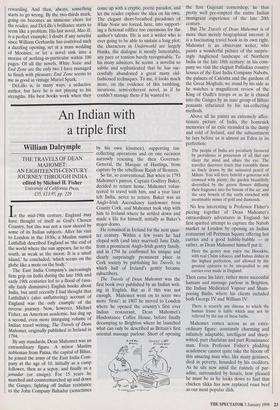An Indian with a triple first
William Dalrymple
THE TRAVELS OF DEAN MAHOMET: AN EIGHTEENTH-CENTURY JOURNEY THROUGH INDIA edited by Michael H. Fisher University of California Press, £35, £13.95, pp. 229 In the mid-19th century, England may have thought of itself as God's Chosen Country, but this was not a view shared by some of its Indian subjects. After his visit to London in the 1830s, a Muslim named Lutfullah described England as 'the end of the world where the sun appears, far to the south, as weak as the moon. It is a small island,' he concluded, 'which seems on the globe like a mole on the body.' The East India Company's increasingly firm grip on India during the late 18th and early 19th centuries led to a flood of (usu- ally fairly dismissive) English books about India, but until recently I had thought that Lutfullah's (also unflattering) account of England was the only example of the reverse journey. Now, however, Michael Fisher, an American academic, has dug up a second, even more intriguing volume of Indian travel writing, The Travels of Dean Mahomet, originally published in Ireland in 1794.
By any standards, Dean Mahomet was an extraordinary figure. A minor Muslim nobleman from Patna, the capital of Bihar, he joined the army of the East India Com- pany at the age of 10, initially as a camp follower, then as a sepoy, and finally as a jemadar (or ensign). For 15 years he marched and countermarched up and down the Ganges, fighting off Indian resistance to the John Company Bahadur (sometimes by his own kinsmen), supporting tax- collecting operations and on one occasion narrowly rescuing the then Governor- General, the Marquis of Hastings, from capture by the rebellious Rajah of Benares.
So far, so conventional. But when in 1793 Mahomet's patron, Captain Godfrey Baker, decided to return home, Mahomet volun- teered to travel with him, and a year later left India, never to return. Baker was an Anglo-Irish Ascendancy landowner from County Cork, and Mahomet took ship with him to Ireland where he settled down and made a life for himself, initially as Baker's major-domo.
He remained in Ireland for the next quar- ter century. Within a few years he had eloped with (and later married) Jane Daly, from a prominent Anglo-Irish gentry family, and in 1794 he confirmed his unique and clearly surprisingly prominent place in Cork society by publishing his Travels, to which half of Ireland's gentry became subscribers.
The Travels of Dean Mahomet was the first book ever published by an Indian writ- ing in English. But as if this was not enough, Mahomet went on to score two more 'firsts': in 1807 he moved to London where he opened the country's first ever Indian restaurant, Dean Mahomet's Hindostanee Coffee House, before finally decamping to Brighton where he launched what can only be described as Britain's first oriental massage parlour. Short of opening the first Gujerati cornershop, he thus pretty well pre-empted the entire Indian immigrant experience of the late 20th century.
But The Travels of Dean Mahomet is of more than merely biographical interest: it is a fascinating travel book in its own right. Mahomet is an observant writer, who paints a wonderful picture of the surpris- ingly Anglicised landscape of Northern India in the late 18th century: in his com- pany we visit the elegant Palladian country houses of the East India Company Nabobs, the palaces of Calcutta and the gardens of the Great Moghuls; we stand by his side as he watches a magnificent review of the King of Oudh's troops or as he is chased into the Ganges by an irate group of Bihari peasants infuriated by his tax-collecting methods.
Above all he paints an extremely affec- tionate picture of India, the homesick memories of an exile stranded in the damp and cold of Ireland, and the subcontinent he lays before us is almost an Eden in its perfection:
The people of India are peculiarly favoured by providence in possession of all that can cheer the mind and allure the eye. The traveller discovers tracts that resemble those so finely drawn by the animated pencil of Milton. You will here behold a generous soil crowned with plenty; the garden beautifully diversified by the gayest flowers diffusing their fragrance into the bosom of the air; and the very bowels of the earth enriched with inestimable mines of gold and diamonds.
No less interesting is Professor Fisher's piecing together of Dean Mahomet's extraordinary adventures in England: his first spirited attempt to capture the Nabob market in London by opening an Indian restaurant off Portman Square offering hot curries and a good hubble-bubble — or rather, as Dean Mahomet himself put it: Here the gentry may enjoy the Hooakha, with real Chilm tobacco, and Indian dishes in the highest perfection, and allowed by the greatest epicures to be unequalled to any curries ever made in England.
Then came his later, rather more successful hamam and massage parlour in Brighton, the Indian Medicated Vapour and Sham- pooing Baths, where his clients included both George IV and William IV:
There is scarcely any disease to which the human frame is liable which may not be relieved by the use of these baths.
Mahomet comes across as an extra- ordinary figure: constantly charming and infinitely adaptable, intelligent and sharp- witted, part charlatan and part Renaissance man. Even Professor Fisher's plodding academese cannot quite take the bloom off this amazing man who, like many geniuses, died in poverty, hounded by his creditors. As he sits now amid the runnels of par- adise, surrounded by houris, how pleased he must be as he looks down to find that chicken tikka has now replaced roast beef as our most popular dish.


















































 Previous page
Previous page